Unit 4 Finding your way reading第二课时课件2021-2022学年牛津译林版七年级英语下册(共32张PPT)
文档属性
| 名称 | Unit 4 Finding your way reading第二课时课件2021-2022学年牛津译林版七年级英语下册(共32张PPT) | 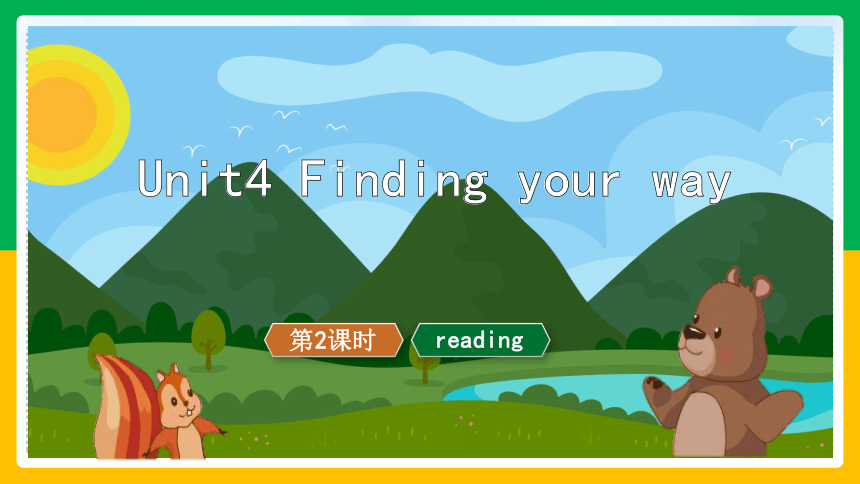 | |
| 格式 | zip | ||
| 文件大小 | 3.3MB | ||
| 资源类型 | 教案 | ||
| 版本资源 | 牛津译林版 | ||
| 科目 | 英语 | ||
| 更新时间 | 2022-02-07 11:07:41 | ||
图片预览

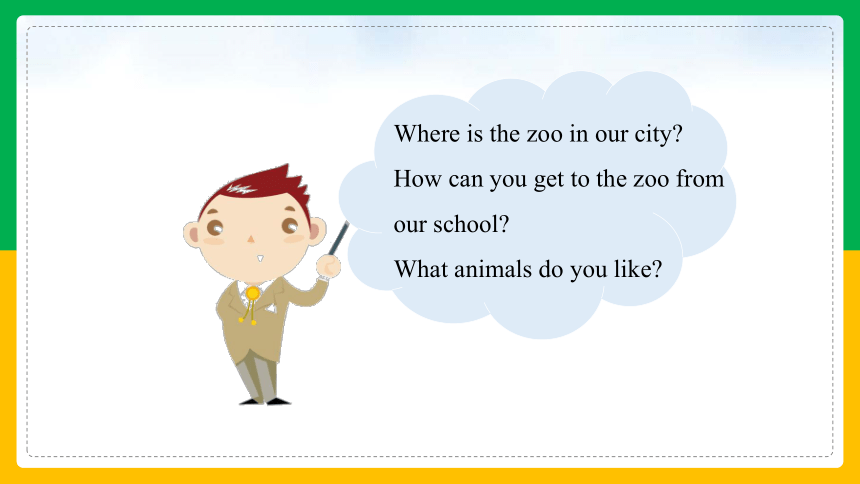
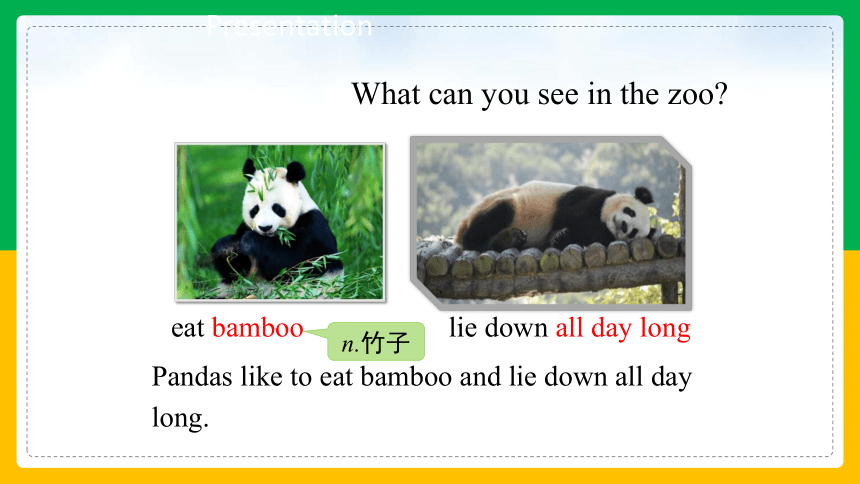
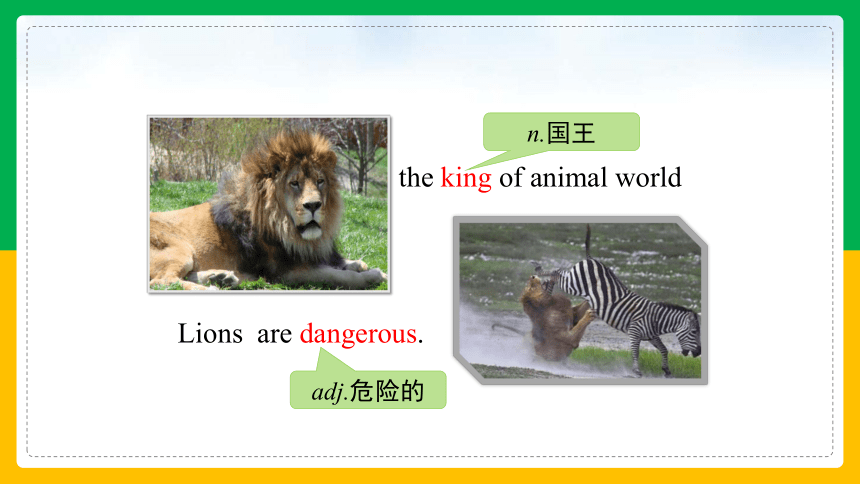
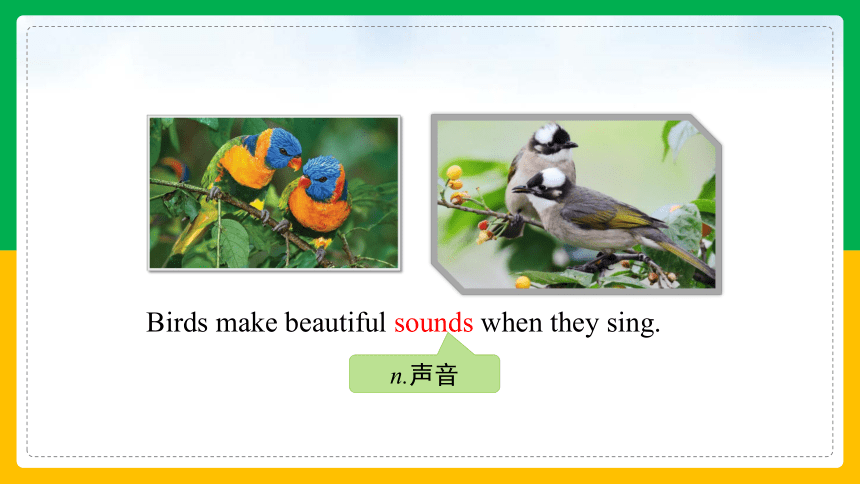
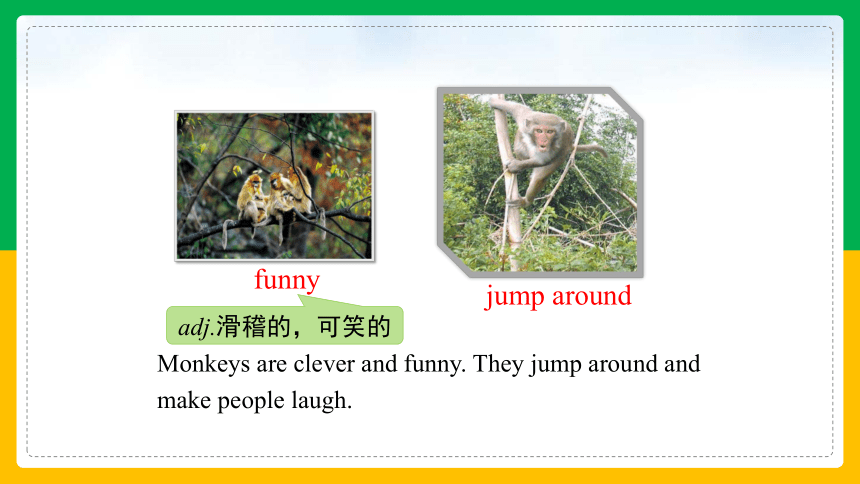
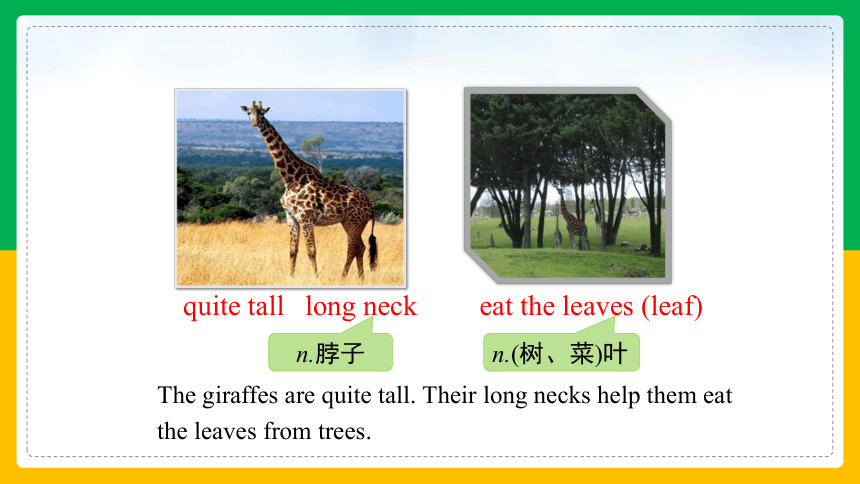

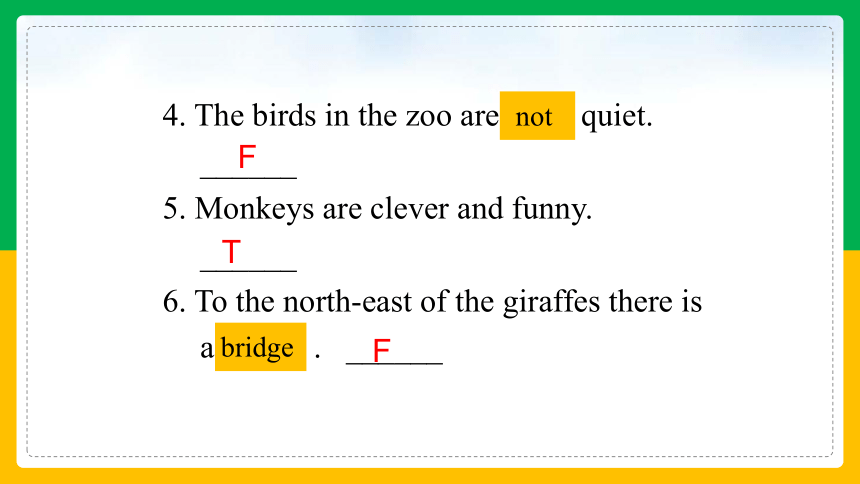

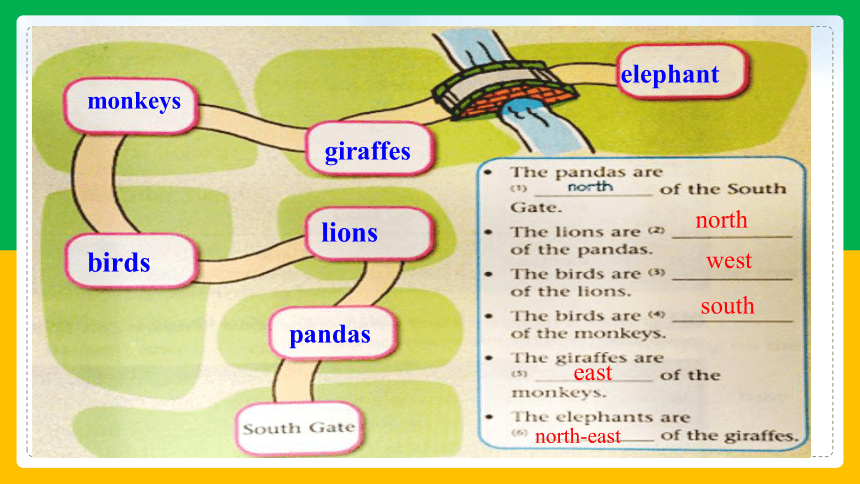
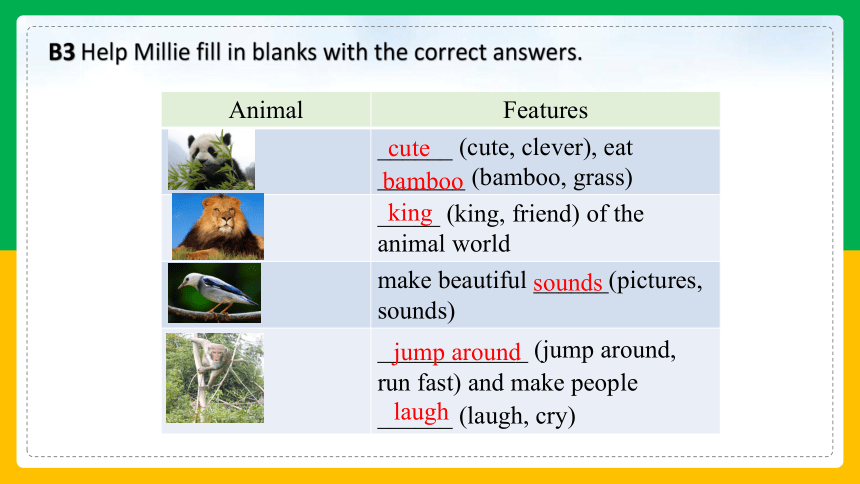
文档简介
(共32张PPT)
第2课时
reading
Unit4 Finding your way
Where is the zoo in our city
How can you get to the zoo from our school
What animals do you like
What can you see in the zoo
eat bamboo
lie down all day long
Pandas like to eat bamboo and lie down all day long.
Presentation
n.竹子
the king of animal world
Lions are dangerous.
adj.危险的
n.国王
Birds make beautiful sounds when they sing.
n.声音
funny
jump around
Monkeys are clever and funny. They jump around and make people laugh.
adj.滑稽的,可笑的
long neck
quite tall
eat the leaves (leaf)
The giraffes are quite tall. Their long necks help them eat the leaves from trees.
n.脖子
n.(树、菜)叶
Fast reading
Read and do “true or false”.
The students start their visit from the North Gate. _____
Pandas do not like to lie down all day long. ______
Visitors cannot go near the lions. ______
T
F
F
South
4. The birds in the zoo are very quiet. ______
5. Monkeys are clever and funny. ______
6. To the north-east of the giraffes there is a hill . ______
T
F
F
not
bridge
Careful reading
Read the introduction on page 44 again. Write down the different animals in the correct position. Then complete the instructions and tell your partner about it.
bird elephants giraffes lions monkeys pandas
B1
pandas
lions
birds
monkeys
elephant
giraffes
north
west
south
east
north-east
Animal Features
panda ______ (cute, clever), eat _______ (bamboo, grass)
lion _____ (king, friend) of the animal world
bird make beautiful ______(pictures, sounds)
monkey ____________ (jump around, run fast) and make people ______ (laugh, cry)
B3 Help Millie fill in blanks with the correct answers.
cute
bamboo
king
sounds
jump around
laugh
Animal Features
giraffe quite _____ (short, tall), long _____ (neck, face)
elephant ______ (large, small) ears like open ______ (umbrellas, fans)
tall
neck
large
fans
B4 Read and complete the conversation.
Wendy: Hi, Millie. How was your trip to the zoo
Millie: Not bad. There are lots of ________ in the zoo.
Wendy: Are there any pandas
Millie: Yes. Pandas are _____. Every year, lots of _______ come to see them.
Wendy: Are there any lions
Millie: Yes, but they’re __________. We can’t go near them.
cute
visitors
dangerous
animals
Wendy: There are also birds, aren’t there
Millie: Yes. I like to hear birds ______. There are monkeys too.
Wendy: I like monkeys. They’re clever and ________.
Millie: Yes, they are. And there are also tall _______. Their long necks help them eat the ________ from trees.
sing
funny
giraffes
leaves
1. Hi, everybody. 大家好。
解析:everybody,代词,意为“每人,人人”,相当于everyone,在句中用作单数,代指每一个人。
如: Everybody is here today. 今天大家都到了.
Not everybody likes this book.
并不是每个人都喜欢这本书。
提醒:当everybody做主语时,谓语动词用第三人称单数形式。
如: Everybody here comes from America.
这里的每个人都来自美国。
2. Go straight on. and you'll find the Panda House. 一直向前走,你们就会看到熊猫馆。
(1) 解析:straight,副词,意为“径直地”,常与动词come, go, walk等连用。
如: Come straight home after school. 放学后直接回家。
拓展:straight还可作形容词,意为“直的,笔直的”。
如: Draw a straight line on the paper. 在纸上画一条直线。
提醒:straight的形容词形式和副词形式都是straight,没有其他形式。
类似的单词:
hard adj. 困难的 → hard adv. 努力地 high adj. 高的 → high adv. 高地 fast adj. 快速的 → fast adv. 快速地
(2) 解析:go on意为“向前走”,其中on是副词,意为“向前移动,进行下去”。
如: Go straight on to the beach. 一直向前走到海滩。
拓展:go on还可表示“继续”,后常跟v. -ing形式,意为“继续做某事”。
go on doing sth. = keep doing sth.
如: Go on reading the text, please. 请继续读课文。
1. They like to eat bamboo and lie down all day long.
它们喜欢吃竹子,而且成天躺在那儿。
解析:all day long意为“整天地”,long为副词,用在表示一段时间的名词之后,起强调作用。
如: They work hard all day long.
他们整天努力工作。
拓展:类似的短语: all month long 整月地;all year long 整年地。
1. Walk along the road. 沿着路走。
解析:along介词,意为“沿着,顺着”,常用于表示沿着马路、街道、河边等,有时可与down、up换用。
如: Walk along the road and you will find the post office.
沿著这条路走,你会找到那个邮局。
1. Remember that they're dangerous. 记住它们很危险。
(1) 解析:remember,动词,意为“记得,记住”,后跟名词、代词、不定式或动名同作宾语。反义词为forget(忘记)。
如: Do you still remember me 你还记得我吗
Sorry, I forget your name. 对不起。我忘记你的名字了。
辨析:remember to do sth.与remember doing sth.
短语 含义 用法
remember to do sth. 意为“记得要做某事” 强调事情还未做
remember doing sth. 意为“记得做过某事” 强调事情是以前做过的
如: Remember to post the letter for me.
记得为我邮寄这封信。
I remember meeting you one evening at the Capital Theatre.
我记得有天晚上在首都剧场遇到你。
一言辩异:
--- Remember to return the magazine to me. 记得将杂志还给我。
--- But I remember returning it to you. 可是我记得已经把它还给你了。
(1) dangerous,形容词,意为“危险的”,在句中作定语或表语。
反义词为safe(安全的)。
如: It's dangerous to play with fire. 玩火是危险的。
拓展:dangerous的词形变化及其相应的反义词:
danger n. → safety
dangerous adj. → safe
dangerously adv. → safely
辨析:dangerous与in danger
dangerous 意为“危险的”,指主语对别人有伤害
in danger 意为“在危险中”,指主语本身处于危险的状态
1. Monkeys are clever and funny.
猴子聪明又滑稽。
解析:funny,形容词,意为“好笑的,滑稽的”,一般指友善的取笑,可修饰人或物,在句中作定语或表语。
如: I like Max because I like funny people. 我喜欢马克斯,因为我喜欢有趣的人。
Tom often tells funny stories. 汤姆经常讲滑稽的故事。
拓展:fun,名词,意为"有趣的事”,为不可数名词。
如: Reading is fun. 阅读是件有趣的事。
1. They jump around and make people laugh.
它们上蹿下跳,惹得人们大笑。
(1) 解析:laugh,动词,意为“笑,大笑”,laugh at sb.意为“取笑/讥笑/嘲笑某人”。
如: The guests all laughed loudly. 客人们都大声地笑了。
Don't laugh at the poor. 不要嘲笑穷人。
辨析:laugh与smile
laugh 指“笑,大笑”,指不但有面部表情,而且有声音的笑。laugh at意为“嘲笑......”如:We shouldn't laugh at him.我们不应该嘲笑他。
smile 指“微笑;笑容”,常表示满意的、怀有好意的、善意的笑。smile at意为“对...微笑”。如:Smile at someone and you are sure to get a smile inreturn.对人微笑,你也一定会被回以微笑。
(2) 解析:make people laugh为“动词十宾语+宾语补足语”结构,
即make sb. do sth. (使某人做某事)。
make为使役动词,后接不带to的动词不定式(即动词原形)作宾语补足语。
如: The strange noise makes him feel frightened at night.
奇怪的噪音使他夜里感到害怕。
拓展:后接不带to的不定式作宾语补足语的动词或动词短语有:
一感(fee),二听(hear, listen to),三让(let,make, have),四看(watch, see, notice, look at)。
提醒:有些动词则必须跟带to的动词不定式作宾语补足语。
如:ask/tell/want sb. (not) to do sth. 要求/告诉/想要某人(不要)做某事。
1. They're quite tall. 它们非常高。
解析:quite,副词,意为“相当,非常”,位于形容词或副词的原级前作状语。
如: The film is quite interesting. 这部电影相当有趣。
拓展:类似quite只修饰原级的副词有very, too, so等。
辨析:quite与very
quite 程度副词,可修饰副词、形容词和动词,跟表示程度的词连用时,有“相当,非常"的意思。跟表示没有程度差距的词连用时,意为“完全”
very 程度副词,意为“很,非常”,可修饰形容词和副词,但不可直接修饰动词
如: I feel quite well. 我感觉身体很不错。 You are quite right. 你完全正确。 This factory is very large. 这家工厂很大。
He runs very fast. 他跑得很快。
提醒:与形容词连用修饰名词时,quite常置于冠词之前,very常置于冠词之后。
如: It's quite a long way. = It's a very long way. 那是一段很长的路。
1. Cross the bridge, and you'll see the elephants. 过了桥,你们会看到大象。
解析:cross,动词,意为“穿过,横过”,指从一个平面通过,即选择较短的距离横穿过去,常用于过马路、河、桥、街等。
cross the road/ river/ bridge/street过马路/河/桥/街。
如: Look left and right, and then cross the road. 左右看看,然后再过马路。
拓展:cross还可作名词,意为“十字架”。
如: You can see a cross on the door of the doctor’s. 在这个诊所的门上你能看见一个十字架。
辨析:cross与across
词条 含义 用法
cross 动词,意为“穿过” 独自作谓语,直接跟宾语
across 介词,意为“穿过” 不能独自作谓语,要和表示移动的动词walk, run, fly, jump等连用,此时相当于cross
如: Be careful when you cross the road. = Be careful when you walk across the road. 你过马路的时候要小心。
提醒:crossing,名词,意为“交叉路口”。
1. Here we are. 我们到了。
解析:这是一个部分倒装句,正常的语序应是“We are here.”。当here位于句首时,一般要引起句子结构的倒装,如果主语是代词,采用部分倒装。
如: Here you are. 给你。
Here it is. 它在这儿。
拓展:主语是名词,句子完全倒装,即整个谓语移至主语前面,其结构是“Here/There +动词+名词.”。
如: Here comes the bus! 公共汽车来了!
There goes the bell! 铃响了!
注意:谓语动词由它们句中的名词或代词决定单复数形式。
如: Here are some books. 这儿有一些书。
Here is your letter. 这是你的信。
第2课时
reading
Unit4 Finding your way
Where is the zoo in our city
How can you get to the zoo from our school
What animals do you like
What can you see in the zoo
eat bamboo
lie down all day long
Pandas like to eat bamboo and lie down all day long.
Presentation
n.竹子
the king of animal world
Lions are dangerous.
adj.危险的
n.国王
Birds make beautiful sounds when they sing.
n.声音
funny
jump around
Monkeys are clever and funny. They jump around and make people laugh.
adj.滑稽的,可笑的
long neck
quite tall
eat the leaves (leaf)
The giraffes are quite tall. Their long necks help them eat the leaves from trees.
n.脖子
n.(树、菜)叶
Fast reading
Read and do “true or false”.
The students start their visit from the North Gate. _____
Pandas do not like to lie down all day long. ______
Visitors cannot go near the lions. ______
T
F
F
South
4. The birds in the zoo are very quiet. ______
5. Monkeys are clever and funny. ______
6. To the north-east of the giraffes there is a hill . ______
T
F
F
not
bridge
Careful reading
Read the introduction on page 44 again. Write down the different animals in the correct position. Then complete the instructions and tell your partner about it.
bird elephants giraffes lions monkeys pandas
B1
pandas
lions
birds
monkeys
elephant
giraffes
north
west
south
east
north-east
Animal Features
panda ______ (cute, clever), eat _______ (bamboo, grass)
lion _____ (king, friend) of the animal world
bird make beautiful ______(pictures, sounds)
monkey ____________ (jump around, run fast) and make people ______ (laugh, cry)
B3 Help Millie fill in blanks with the correct answers.
cute
bamboo
king
sounds
jump around
laugh
Animal Features
giraffe quite _____ (short, tall), long _____ (neck, face)
elephant ______ (large, small) ears like open ______ (umbrellas, fans)
tall
neck
large
fans
B4 Read and complete the conversation.
Wendy: Hi, Millie. How was your trip to the zoo
Millie: Not bad. There are lots of ________ in the zoo.
Wendy: Are there any pandas
Millie: Yes. Pandas are _____. Every year, lots of _______ come to see them.
Wendy: Are there any lions
Millie: Yes, but they’re __________. We can’t go near them.
cute
visitors
dangerous
animals
Wendy: There are also birds, aren’t there
Millie: Yes. I like to hear birds ______. There are monkeys too.
Wendy: I like monkeys. They’re clever and ________.
Millie: Yes, they are. And there are also tall _______. Their long necks help them eat the ________ from trees.
sing
funny
giraffes
leaves
1. Hi, everybody. 大家好。
解析:everybody,代词,意为“每人,人人”,相当于everyone,在句中用作单数,代指每一个人。
如: Everybody is here today. 今天大家都到了.
Not everybody likes this book.
并不是每个人都喜欢这本书。
提醒:当everybody做主语时,谓语动词用第三人称单数形式。
如: Everybody here comes from America.
这里的每个人都来自美国。
2. Go straight on. and you'll find the Panda House. 一直向前走,你们就会看到熊猫馆。
(1) 解析:straight,副词,意为“径直地”,常与动词come, go, walk等连用。
如: Come straight home after school. 放学后直接回家。
拓展:straight还可作形容词,意为“直的,笔直的”。
如: Draw a straight line on the paper. 在纸上画一条直线。
提醒:straight的形容词形式和副词形式都是straight,没有其他形式。
类似的单词:
hard adj. 困难的 → hard adv. 努力地 high adj. 高的 → high adv. 高地 fast adj. 快速的 → fast adv. 快速地
(2) 解析:go on意为“向前走”,其中on是副词,意为“向前移动,进行下去”。
如: Go straight on to the beach. 一直向前走到海滩。
拓展:go on还可表示“继续”,后常跟v. -ing形式,意为“继续做某事”。
go on doing sth. = keep doing sth.
如: Go on reading the text, please. 请继续读课文。
1. They like to eat bamboo and lie down all day long.
它们喜欢吃竹子,而且成天躺在那儿。
解析:all day long意为“整天地”,long为副词,用在表示一段时间的名词之后,起强调作用。
如: They work hard all day long.
他们整天努力工作。
拓展:类似的短语: all month long 整月地;all year long 整年地。
1. Walk along the road. 沿着路走。
解析:along介词,意为“沿着,顺着”,常用于表示沿着马路、街道、河边等,有时可与down、up换用。
如: Walk along the road and you will find the post office.
沿著这条路走,你会找到那个邮局。
1. Remember that they're dangerous. 记住它们很危险。
(1) 解析:remember,动词,意为“记得,记住”,后跟名词、代词、不定式或动名同作宾语。反义词为forget(忘记)。
如: Do you still remember me 你还记得我吗
Sorry, I forget your name. 对不起。我忘记你的名字了。
辨析:remember to do sth.与remember doing sth.
短语 含义 用法
remember to do sth. 意为“记得要做某事” 强调事情还未做
remember doing sth. 意为“记得做过某事” 强调事情是以前做过的
如: Remember to post the letter for me.
记得为我邮寄这封信。
I remember meeting you one evening at the Capital Theatre.
我记得有天晚上在首都剧场遇到你。
一言辩异:
--- Remember to return the magazine to me. 记得将杂志还给我。
--- But I remember returning it to you. 可是我记得已经把它还给你了。
(1) dangerous,形容词,意为“危险的”,在句中作定语或表语。
反义词为safe(安全的)。
如: It's dangerous to play with fire. 玩火是危险的。
拓展:dangerous的词形变化及其相应的反义词:
danger n. → safety
dangerous adj. → safe
dangerously adv. → safely
辨析:dangerous与in danger
dangerous 意为“危险的”,指主语对别人有伤害
in danger 意为“在危险中”,指主语本身处于危险的状态
1. Monkeys are clever and funny.
猴子聪明又滑稽。
解析:funny,形容词,意为“好笑的,滑稽的”,一般指友善的取笑,可修饰人或物,在句中作定语或表语。
如: I like Max because I like funny people. 我喜欢马克斯,因为我喜欢有趣的人。
Tom often tells funny stories. 汤姆经常讲滑稽的故事。
拓展:fun,名词,意为"有趣的事”,为不可数名词。
如: Reading is fun. 阅读是件有趣的事。
1. They jump around and make people laugh.
它们上蹿下跳,惹得人们大笑。
(1) 解析:laugh,动词,意为“笑,大笑”,laugh at sb.意为“取笑/讥笑/嘲笑某人”。
如: The guests all laughed loudly. 客人们都大声地笑了。
Don't laugh at the poor. 不要嘲笑穷人。
辨析:laugh与smile
laugh 指“笑,大笑”,指不但有面部表情,而且有声音的笑。laugh at意为“嘲笑......”如:We shouldn't laugh at him.我们不应该嘲笑他。
smile 指“微笑;笑容”,常表示满意的、怀有好意的、善意的笑。smile at意为“对...微笑”。如:Smile at someone and you are sure to get a smile inreturn.对人微笑,你也一定会被回以微笑。
(2) 解析:make people laugh为“动词十宾语+宾语补足语”结构,
即make sb. do sth. (使某人做某事)。
make为使役动词,后接不带to的动词不定式(即动词原形)作宾语补足语。
如: The strange noise makes him feel frightened at night.
奇怪的噪音使他夜里感到害怕。
拓展:后接不带to的不定式作宾语补足语的动词或动词短语有:
一感(fee),二听(hear, listen to),三让(let,make, have),四看(watch, see, notice, look at)。
提醒:有些动词则必须跟带to的动词不定式作宾语补足语。
如:ask/tell/want sb. (not) to do sth. 要求/告诉/想要某人(不要)做某事。
1. They're quite tall. 它们非常高。
解析:quite,副词,意为“相当,非常”,位于形容词或副词的原级前作状语。
如: The film is quite interesting. 这部电影相当有趣。
拓展:类似quite只修饰原级的副词有very, too, so等。
辨析:quite与very
quite 程度副词,可修饰副词、形容词和动词,跟表示程度的词连用时,有“相当,非常"的意思。跟表示没有程度差距的词连用时,意为“完全”
very 程度副词,意为“很,非常”,可修饰形容词和副词,但不可直接修饰动词
如: I feel quite well. 我感觉身体很不错。 You are quite right. 你完全正确。 This factory is very large. 这家工厂很大。
He runs very fast. 他跑得很快。
提醒:与形容词连用修饰名词时,quite常置于冠词之前,very常置于冠词之后。
如: It's quite a long way. = It's a very long way. 那是一段很长的路。
1. Cross the bridge, and you'll see the elephants. 过了桥,你们会看到大象。
解析:cross,动词,意为“穿过,横过”,指从一个平面通过,即选择较短的距离横穿过去,常用于过马路、河、桥、街等。
cross the road/ river/ bridge/street过马路/河/桥/街。
如: Look left and right, and then cross the road. 左右看看,然后再过马路。
拓展:cross还可作名词,意为“十字架”。
如: You can see a cross on the door of the doctor’s. 在这个诊所的门上你能看见一个十字架。
辨析:cross与across
词条 含义 用法
cross 动词,意为“穿过” 独自作谓语,直接跟宾语
across 介词,意为“穿过” 不能独自作谓语,要和表示移动的动词walk, run, fly, jump等连用,此时相当于cross
如: Be careful when you cross the road. = Be careful when you walk across the road. 你过马路的时候要小心。
提醒:crossing,名词,意为“交叉路口”。
1. Here we are. 我们到了。
解析:这是一个部分倒装句,正常的语序应是“We are here.”。当here位于句首时,一般要引起句子结构的倒装,如果主语是代词,采用部分倒装。
如: Here you are. 给你。
Here it is. 它在这儿。
拓展:主语是名词,句子完全倒装,即整个谓语移至主语前面,其结构是“Here/There +动词+名词.”。
如: Here comes the bus! 公共汽车来了!
There goes the bell! 铃响了!
注意:谓语动词由它们句中的名词或代词决定单复数形式。
如: Here are some books. 这儿有一些书。
Here is your letter. 这是你的信。
